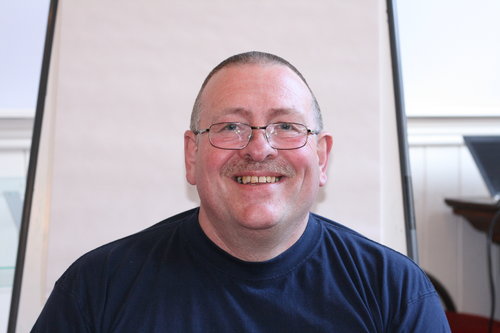Interview with PJ Cleere
June 27 2022

PJ Cleere leads DFI's Community Development work from his Carlow base. You might expect someone in his role to be a people-person - and you’d be one hundred per cent correct. PJ believes in meeting people, empowerment and cups of tea! Here we ask PJ a series of questions about his work and beliefs for the sector.
- What piece of advice would you give to a member organisation around?
Embrace and plan for the changes that are here. Take steps to make sure service users can and do have more choice and are being heard. Try not to hold on to more traditional models of service delivery. Your service owners are your strength. Building the capacity of self-advocates in your organisation to direct your work and activities can only result in better, more relevant services and more person-centred organisations for everyone.
- What would be a game changer?
Find what unites us. Forget history and the petty politics between agencies and stop working in silos. Solidarity and collaboration are vital. The sector must unite around our common purpose of social inclusion and equality in Irish society of those we serve. We must find our own confidence and develop self -esteem about our work and the value of our sector to broader society.
- With over 30 years voluntary experience how would you describe the current landscape?
There is a fundamental shift underway both in the HSE and in society generally. In disability, the voices of those receiving services are becoming more of a priority for decision makers. This is expanding into all areas of life, so disabled people can at last claim their right to be recognised as equal citizens with the right to expect equality.
- What drives your passion for equity and social inclusion?
My first memories of equality issues stem from witnessing the 1960’s US civil rights movements and the NI struggles. Drawing on a strong family history and over 30 years of on-the-ground activism, I can clearly see that for people with disabilities and their families, social inclusion, poverty, and inequality still exist. I still believe change is possible, and I want people with disabilities to be a positive driver of that change.
- What do you want to see happen for people with disabilities?
I want to see disabled people being facilitated to a point where they can exercise real choice, not just in service provision, but in every area of their lives.
- What would be the single most effective influence for positive change in the daily lives of people? The robust implementation of the UNCRPD on a local community level. This would mean equal access to housing, leisure, education, employment, and training. Essentially, it would facilitate engagement in local decisions becoming the ‘norm’, driving change that impacts people in their everyday lives.
- What are the greatest challenges to progress for people with disabilities?
Changing several misconceptions about disability. To name a few, there is an incorrect view that people with disabilities are fully taken care of by the State. This is not true. That people with disabilities need mainly medical services to be equal (not true), and that they cannot or choose not to work or engage in society (not true). Another challenge is building the capacity and confidence of people with disabilities to speak out more assertively and in a united way, raising issues for themselves but also as a collective.
- Tell us something we may not know about DFI?
A number of DFI staff have experiences of disability. Speaking for myself and my family, I have lived with multiple disabilities for many years and brought up my family on disability allowance. I am acutely aware of the issues people face. My wife also developed a chronic disabling condition, which she has lived with for over twenty years. Like many people living with disabilities, I get on with life, however I believe to affect societal change, it is increasingly important to speak openly about our lived experiences of disability and to use real life experience to support a realistic and bigger picture perspective in broader society.
- Finally….
I am particularly proud of our members who daily work hard to support and bring positive opportunities to all they serve. In partnership with many other C&V organisations and public bodies, our members magnificently rose to the challenges of Covid. Working tirelessly, they seek out and respond to the most marginalised people in our communities. We need to celebrate this and own it because it truly demonstrates the intrinsic value of our members and the C&V sector bring to Irish communities and the country, both now and for the future.